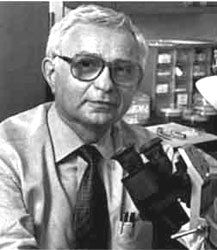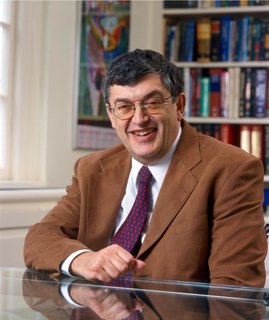Related Research Articles

Stanley "Stan" Falkow was an American microbiologist and a professor of microbiology at Georgetown University, University of Washington, and Stanford University School of Medicine. Falkow is known as the father of the field of molecular microbial pathogenesis. He formulated molecular Koch's postulates, which have guided the study of the microbial determinants of infectious diseases since the late 1980s. Falkow spent over 50 years uncovering molecular mechanisms of how bacteria cause disease and how to disarm them. Falkow also was one of the first scientists to investigate antimicrobial resistance, and presented his research extensively to scientific, government, and lay audiences explaining the spread of resistance from one organism to another, now known as horizontal gene transfer, and the implications of this phenomenon on our ability to combat infections in the future.
Ellen S. Vitetta is the director of the Cancer Immunobiology Center at the University of Texas Southwestern Medical Center in Dallas.
Robert Gordon Webster is an avian influenza authority who correctly posited that pandemic strains of flu arise from genes in flu virus strains in nonhumans; for example, via a reassortment of genetic segments between viruses in humans and nonhumans rather than by mutations in annual human flu strains.
Jonathan Roger Beckwith is an American microbiologist and geneticist. He is the American Cancer Society Professor in the Department of Microbiology and Immunobiology at Harvard Medical School in Boston, Massachusetts.

Bernard Roizman is an American scientist born in Romania. He is the Joseph Regenstein Distinguished Service Professor of Virology in the Departments of Microbiology and Molecular Genetics and Cell Biology at the University of Chicago.
Harold Amos was an African American microbiologist and professor. He taught at Harvard Medical School for nearly fifty years and was the first African-American department chair of the school.
Laurie Hollis Glimcher is an American physician-scientist who was appointed president and CEO of Dana-Farber Cancer Institute in October 2016. She was elected a Member of the American Philosophical Society in 2019.
Julian Edmund Davies FRS is a British microbiologist, professor emeritus, and Principal Investigator of the Davies Lab, at University of British Columbia.
Bernard Nathan Fields was an American microbiologist and virologist. Fields was a member of the National Academy of Sciences.

Stephen C. Harrison is professor of biological chemistry and molecular pharmacology, professor of pediatrics, and director of the Center for Molecular and Cellular Dynamics of Harvard Medical School, head of the Laboratory of Molecular Medicine at Boston Children's Hospital, and investigator of the Howard Hughes Medical Institute.
Bernard Moss is a virologist at the National Institute of Allergy and Infectious Diseases, part of the United States National Institutes of Health. He is the Chief of the NIAID Laboratory of Viral Diseases and of the NIAID Genetic Engineering Section. He is known for his work on poxviruses.
Barry R. Bloom is Harvard University Distinguished Service Professor and Joan L. and Julius H. Jacobson Professor of Public Health in the Department of Immunology and Infectious Diseases and Department of Global Health and Population in the Harvard T.H. Chan School of Public Health in Boston, where he served as dean of the faculty from 1998 through December 31, 2008.
Earl Warren Davie was an American biochemist. He was a professor emeritus of biochemistry at the University of Washington. Davie studied the blood proteins involved in coagulation and was among the first scientists to describe the steps of the clotting process. He was a member of the National Academy of Sciences and a fellow of the American Academy of Arts and Sciences.
Thomas Charles Merigan was born January 18, 1934 in San Francisco. He is an American virologist and the George E. and Lucy Becker Professor of Medicine, Emeritus at the Stanford University School of Medicine. Merigan's research first focused on human viral pathogenesis, basic and clinical studies of interferon, and then developing the first systemically active antiviral drugs including those effectively treatIng HIV/AIDS, herpesviruses and hepatitis B. He is also credited with helping to develop the use of interferons as antiviral, immunomodulating and antitumor therapies. Merigan joined the Stanford faculty in 1963 and assumed full emeritus status in 2007. In 2004 he was also identified as one of the 250 most cited investigators in clinical medicine over the last 20 years by the Institute for Scientific Information. Merigan also was ranked 23rd among the 1000 top US microbiologists by Research.com. in 2022. He had over 95 postdoctoral fellows, students and visiting scientists with whom he published 577 papers, 24 books and published symposia, and held 11 US patents. Two of his books went into multiple editions- one into a 4th edition and the other into a 3rd. His students have become leaders in the fields of infectious diseases and microbiology both in the US and the world. Seven of his students subsequently joined the Stanford medical faculty. He was a board member of 28 journals and a member of 23 learned societies. He told his life story in a book entitled Pioneering Viral Therapy,a Life in Academic Medicine, published by Amazon/Kindle/CreateSpace in 2017.

Michael O. Thorner is David C. Harrison Professor Emeritus of Internal Medicine at the University of Virginia specializing in endocrinology and metabolism. He was previously the chief of the division of endocrinology and metabolism and the chair of the department of internal medicine.
Dimitrios P. Kontoyiannis is the Robert C Hickey Chair in Clinical Care and Deputy Head for Research in the Division of Internal Medicine at The University of Texas MD Anderson Cancer Center in Houston, Texas. He received his medical degree as valedictorian Summa Cum Laude from the National and Kapodistrian University of Athens, Greece. Kontoyiannis was trained in Internal Medicine at Baylor College of Medicine in Houston, where he served as a Chief Medical Resident. He was subsequently trained as a clinical fellow in Infectious Diseases at Massachusetts General Hospital and obtained a master's degree in Clinical Sciences from Harvard Medical School in Boston. He spent three years at the Whitehead Institute for Biomedical Sciences/Massachusetts Institute of Technology as a fellow in the Harvard MIT Clinical Investigators Training Program.
Donald S. Burke is an expert on the prevention, diagnosis, and control of infectious diseases of global concern. He is a distinguished University Professor of Health Science and Policy at the University of Pittsburgh.
Elliott D. Kieff is the Harriett Ryan Albee Professor of Microbiology and Immunobiology at Harvard Medical School and Brigham and Women’s Hospital. He had previously served as Chair of the Virology Program at Harvard Medical School from 1991 to 2004.

Christine Edry Seidman is the Thomas W. Smith Professor of Medicine at Harvard Medical School and director of the Cardiovascular Genetics Center at Brigham and Women's Hospital. She operates a joint lab with her husband, Jonathan Seidman, where they study genetic mechanisms of heart disease. In recognition of her scientific contributions, she was elected as a fellow of the National Academy of Sciences, American Academy of Arts and Sciences, and National Academy of Medicine.

Gerald T. Keusch is an American physician-scientist and academic administrator. Keusch is the associate provost for global health at Boston University Medical Campus and a professor of international health and medicine at Boston University School of Public Health. He was the director of John E. Fogarty International Center and the associate director of international research at the National Institutes of Health from 1998 to 2003.
References
- 1 2 3 4 5 Nemeh, Katherine H., ed. (2008). "American Men & Women of Science: A Biographical Directory of Today's Leaders in Physical, Biological, and Related Sciences". Gale (25 ed.). Detroit, Michigan. 2.
- 1 2 3 4 "R. John Collier, PH.D wins Bristol-Myers Squibb Infectious Disease Research Award". EurekAlert!. July 17, 2003. Retrieved 2018-12-03.
- ↑ "R. John Collier". National Academy of Sciences . Retrieved 2018-12-03.